HI6005 - Management and Organizations: Culture and Strategy Report
VerifiedAdded on 2023/06/12
|9
|1636
|359
Report
AI Summary
This report explores the significance of enterprise culture for business success, focusing on aligning corporate culture with effective strategy and the importance of a strong organizational culture. It discusses different types of enterprise cultures, including Adhocracy, Hierarchy, Market, and Clan cultures, and how they impact organizational behavior. The report emphasizes that while strategy provides direction, culture determines execution, leading to a competitive advantage when aligned. It also addresses varying definitions of organizational culture and highlights the role of leadership in fostering a strong, adaptable culture that drives employee commitment and organizational success. This document is available on Desklib, where students can find a wealth of resources including past papers and solved assignments.
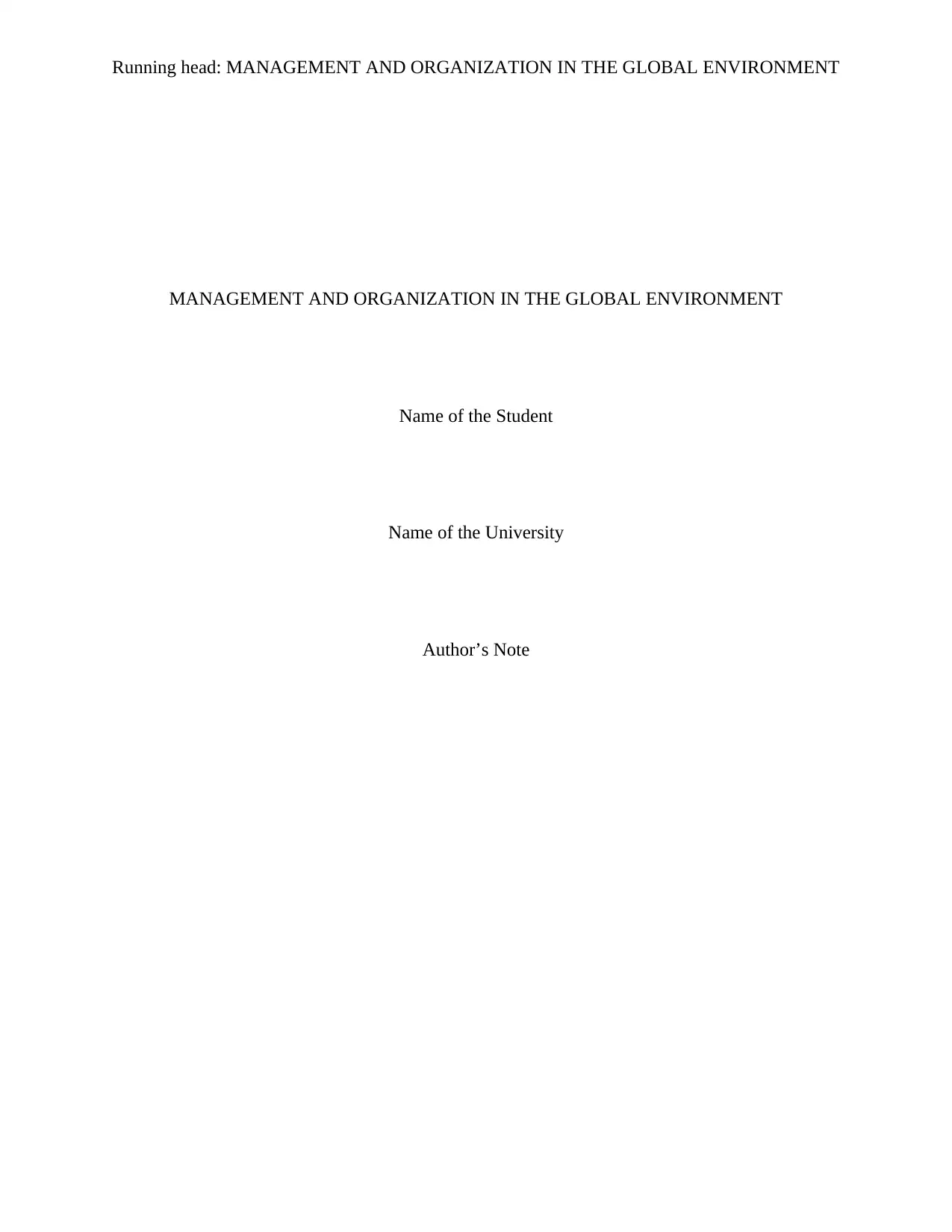
Running head: MANAGEMENT AND ORGANIZATION IN THE GLOBAL ENVIRONMENT
MANAGEMENT AND ORGANIZATION IN THE GLOBAL ENVIRONMENT
Name of the Student
Name of the University
Author’s Note
MANAGEMENT AND ORGANIZATION IN THE GLOBAL ENVIRONMENT
Name of the Student
Name of the University
Author’s Note
Paraphrase This Document
Need a fresh take? Get an instant paraphrase of this document with our AI Paraphraser
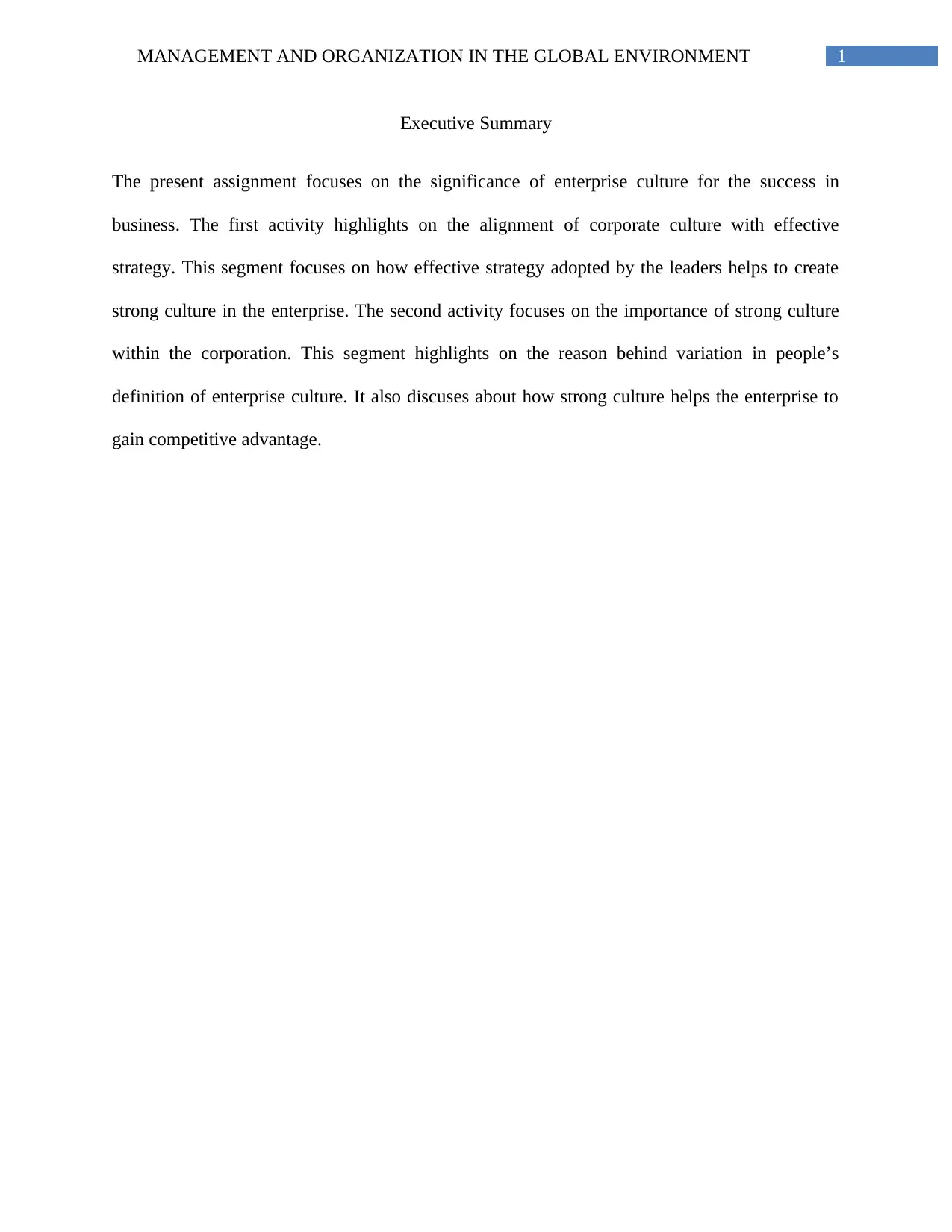
1MANAGEMENT AND ORGANIZATION IN THE GLOBAL ENVIRONMENT
Executive Summary
The present assignment focuses on the significance of enterprise culture for the success in
business. The first activity highlights on the alignment of corporate culture with effective
strategy. This segment focuses on how effective strategy adopted by the leaders helps to create
strong culture in the enterprise. The second activity focuses on the importance of strong culture
within the corporation. This segment highlights on the reason behind variation in people’s
definition of enterprise culture. It also discuses about how strong culture helps the enterprise to
gain competitive advantage.
Executive Summary
The present assignment focuses on the significance of enterprise culture for the success in
business. The first activity highlights on the alignment of corporate culture with effective
strategy. This segment focuses on how effective strategy adopted by the leaders helps to create
strong culture in the enterprise. The second activity focuses on the importance of strong culture
within the corporation. This segment highlights on the reason behind variation in people’s
definition of enterprise culture. It also discuses about how strong culture helps the enterprise to
gain competitive advantage.
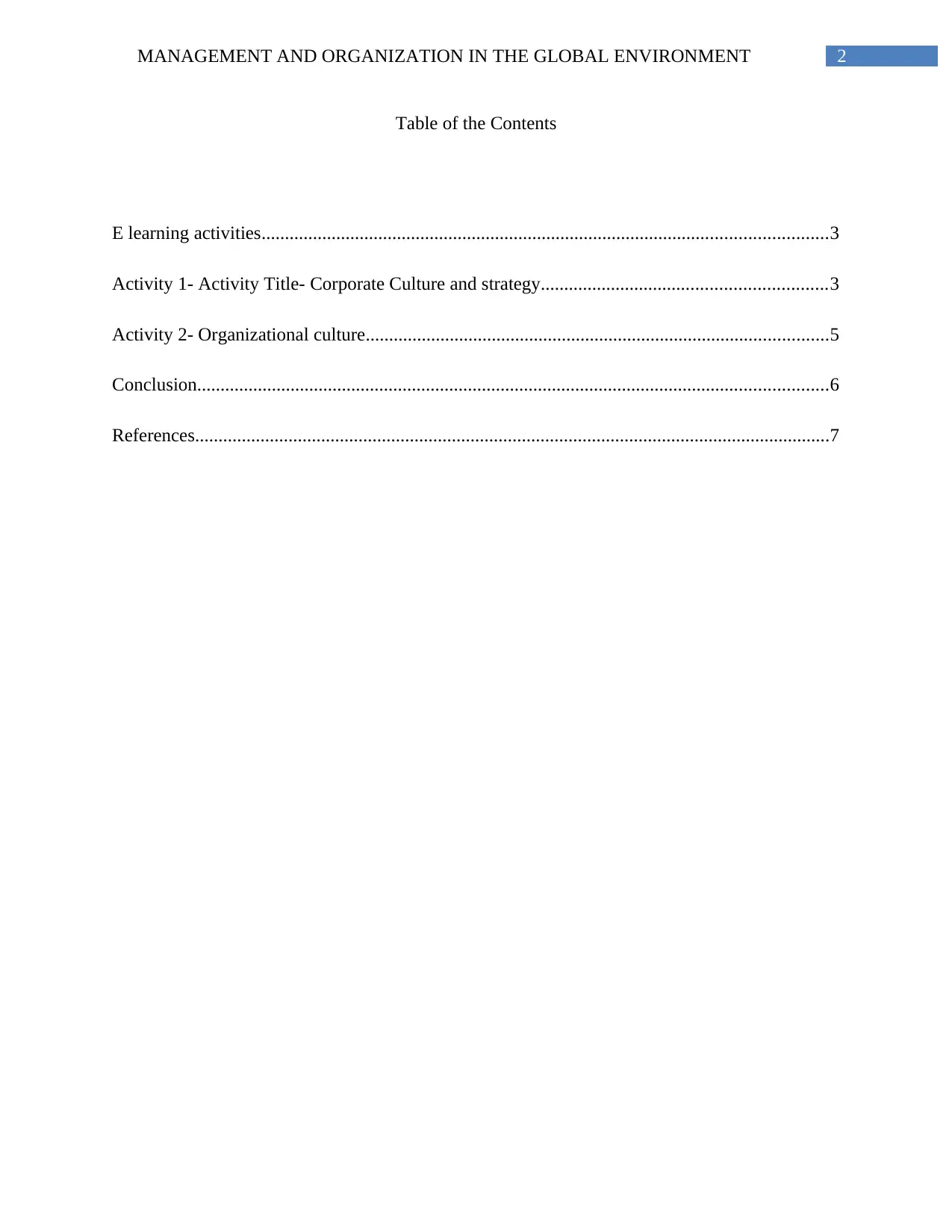
2MANAGEMENT AND ORGANIZATION IN THE GLOBAL ENVIRONMENT
Table of the Contents
E learning activities.........................................................................................................................3
Activity 1- Activity Title- Corporate Culture and strategy.............................................................3
Activity 2- Organizational culture...................................................................................................5
Conclusion.......................................................................................................................................6
References........................................................................................................................................7
Table of the Contents
E learning activities.........................................................................................................................3
Activity 1- Activity Title- Corporate Culture and strategy.............................................................3
Activity 2- Organizational culture...................................................................................................5
Conclusion.......................................................................................................................................6
References........................................................................................................................................7
⊘ This is a preview!⊘
Do you want full access?
Subscribe today to unlock all pages.

Trusted by 1+ million students worldwide
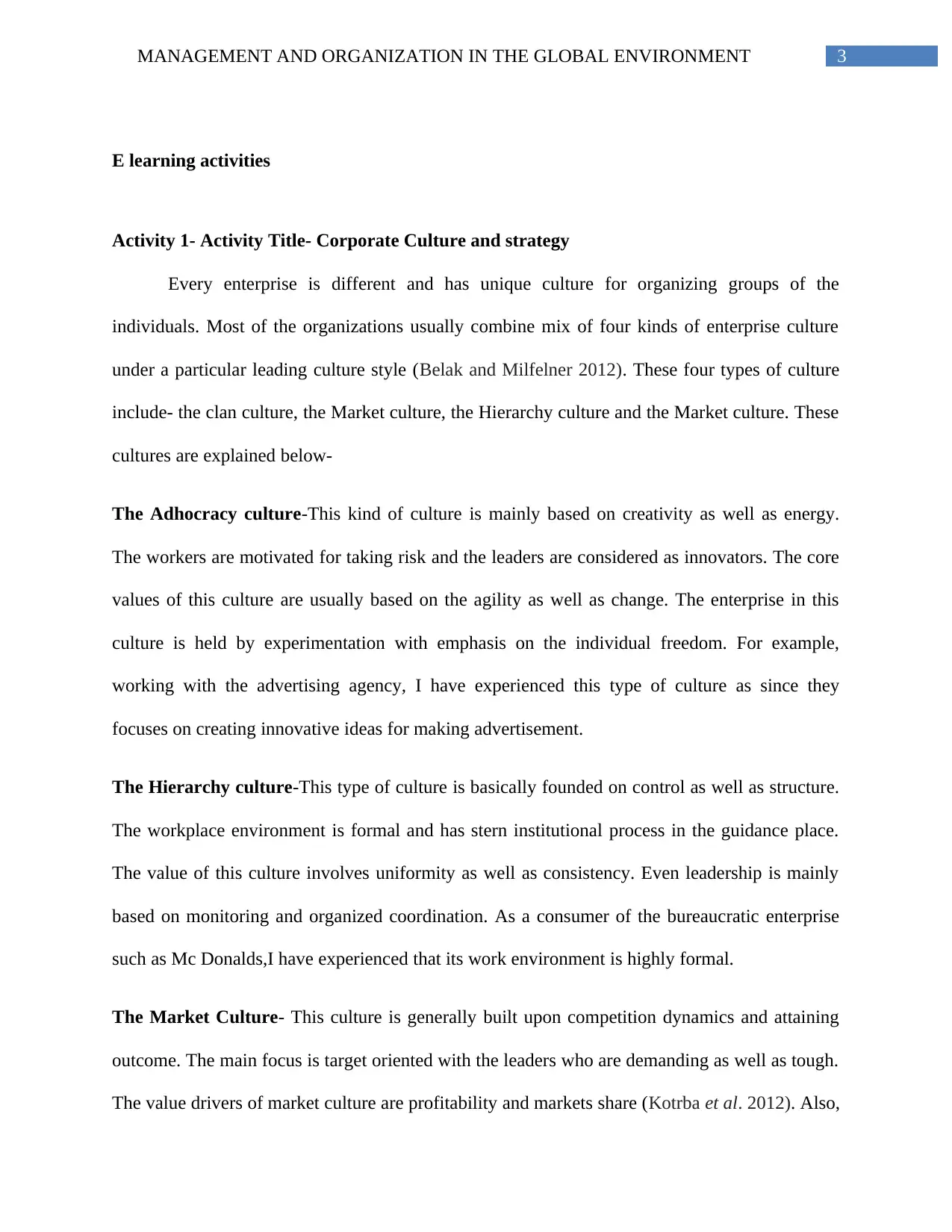
3MANAGEMENT AND ORGANIZATION IN THE GLOBAL ENVIRONMENT
E learning activities
Activity 1- Activity Title- Corporate Culture and strategy
Every enterprise is different and has unique culture for organizing groups of the
individuals. Most of the organizations usually combine mix of four kinds of enterprise culture
under a particular leading culture style (Belak and Milfelner 2012). These four types of culture
include- the clan culture, the Market culture, the Hierarchy culture and the Market culture. These
cultures are explained below-
The Adhocracy culture-This kind of culture is mainly based on creativity as well as energy.
The workers are motivated for taking risk and the leaders are considered as innovators. The core
values of this culture are usually based on the agility as well as change. The enterprise in this
culture is held by experimentation with emphasis on the individual freedom. For example,
working with the advertising agency, I have experienced this type of culture as since they
focuses on creating innovative ideas for making advertisement.
The Hierarchy culture-This type of culture is basically founded on control as well as structure.
The workplace environment is formal and has stern institutional process in the guidance place.
The value of this culture involves uniformity as well as consistency. Even leadership is mainly
based on monitoring and organized coordination. As a consumer of the bureaucratic enterprise
such as Mc Donalds,I have experienced that its work environment is highly formal.
The Market Culture- This culture is generally built upon competition dynamics and attaining
outcome. The main focus is target oriented with the leaders who are demanding as well as tough.
The value drivers of market culture are profitability and markets share (Kotrba et al. 2012). Also,
E learning activities
Activity 1- Activity Title- Corporate Culture and strategy
Every enterprise is different and has unique culture for organizing groups of the
individuals. Most of the organizations usually combine mix of four kinds of enterprise culture
under a particular leading culture style (Belak and Milfelner 2012). These four types of culture
include- the clan culture, the Market culture, the Hierarchy culture and the Market culture. These
cultures are explained below-
The Adhocracy culture-This kind of culture is mainly based on creativity as well as energy.
The workers are motivated for taking risk and the leaders are considered as innovators. The core
values of this culture are usually based on the agility as well as change. The enterprise in this
culture is held by experimentation with emphasis on the individual freedom. For example,
working with the advertising agency, I have experienced this type of culture as since they
focuses on creating innovative ideas for making advertisement.
The Hierarchy culture-This type of culture is basically founded on control as well as structure.
The workplace environment is formal and has stern institutional process in the guidance place.
The value of this culture involves uniformity as well as consistency. Even leadership is mainly
based on monitoring and organized coordination. As a consumer of the bureaucratic enterprise
such as Mc Donalds,I have experienced that its work environment is highly formal.
The Market Culture- This culture is generally built upon competition dynamics and attaining
outcome. The main focus is target oriented with the leaders who are demanding as well as tough.
The value drivers of market culture are profitability and markets share (Kotrba et al. 2012). Also,
Paraphrase This Document
Need a fresh take? Get an instant paraphrase of this document with our AI Paraphraser
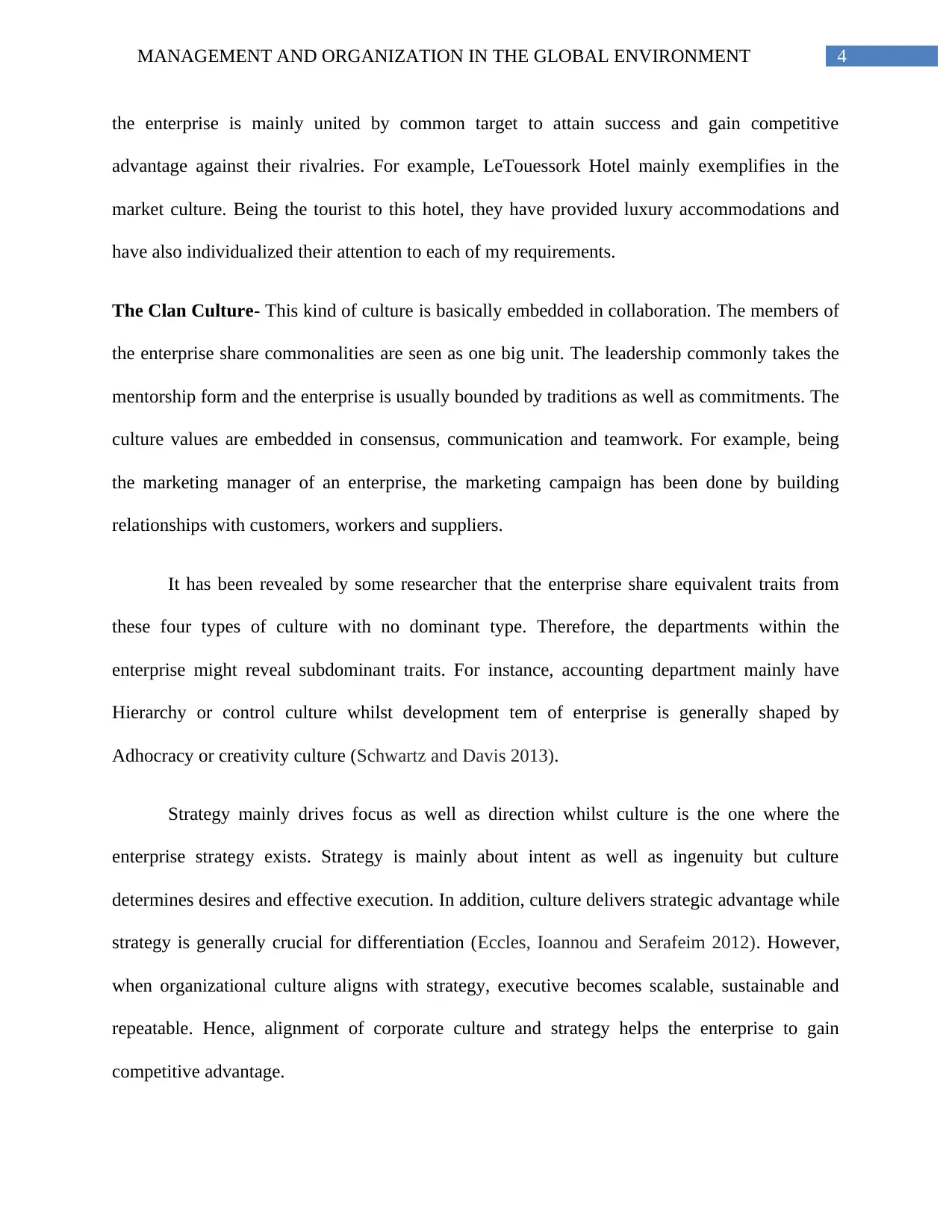
4MANAGEMENT AND ORGANIZATION IN THE GLOBAL ENVIRONMENT
the enterprise is mainly united by common target to attain success and gain competitive
advantage against their rivalries. For example, LeTouessork Hotel mainly exemplifies in the
market culture. Being the tourist to this hotel, they have provided luxury accommodations and
have also individualized their attention to each of my requirements.
The Clan Culture- This kind of culture is basically embedded in collaboration. The members of
the enterprise share commonalities are seen as one big unit. The leadership commonly takes the
mentorship form and the enterprise is usually bounded by traditions as well as commitments. The
culture values are embedded in consensus, communication and teamwork. For example, being
the marketing manager of an enterprise, the marketing campaign has been done by building
relationships with customers, workers and suppliers.
It has been revealed by some researcher that the enterprise share equivalent traits from
these four types of culture with no dominant type. Therefore, the departments within the
enterprise might reveal subdominant traits. For instance, accounting department mainly have
Hierarchy or control culture whilst development tem of enterprise is generally shaped by
Adhocracy or creativity culture (Schwartz and Davis 2013).
Strategy mainly drives focus as well as direction whilst culture is the one where the
enterprise strategy exists. Strategy is mainly about intent as well as ingenuity but culture
determines desires and effective execution. In addition, culture delivers strategic advantage while
strategy is generally crucial for differentiation (Eccles, Ioannou and Serafeim 2012). However,
when organizational culture aligns with strategy, executive becomes scalable, sustainable and
repeatable. Hence, alignment of corporate culture and strategy helps the enterprise to gain
competitive advantage.
the enterprise is mainly united by common target to attain success and gain competitive
advantage against their rivalries. For example, LeTouessork Hotel mainly exemplifies in the
market culture. Being the tourist to this hotel, they have provided luxury accommodations and
have also individualized their attention to each of my requirements.
The Clan Culture- This kind of culture is basically embedded in collaboration. The members of
the enterprise share commonalities are seen as one big unit. The leadership commonly takes the
mentorship form and the enterprise is usually bounded by traditions as well as commitments. The
culture values are embedded in consensus, communication and teamwork. For example, being
the marketing manager of an enterprise, the marketing campaign has been done by building
relationships with customers, workers and suppliers.
It has been revealed by some researcher that the enterprise share equivalent traits from
these four types of culture with no dominant type. Therefore, the departments within the
enterprise might reveal subdominant traits. For instance, accounting department mainly have
Hierarchy or control culture whilst development tem of enterprise is generally shaped by
Adhocracy or creativity culture (Schwartz and Davis 2013).
Strategy mainly drives focus as well as direction whilst culture is the one where the
enterprise strategy exists. Strategy is mainly about intent as well as ingenuity but culture
determines desires and effective execution. In addition, culture delivers strategic advantage while
strategy is generally crucial for differentiation (Eccles, Ioannou and Serafeim 2012). However,
when organizational culture aligns with strategy, executive becomes scalable, sustainable and
repeatable. Hence, alignment of corporate culture and strategy helps the enterprise to gain
competitive advantage.
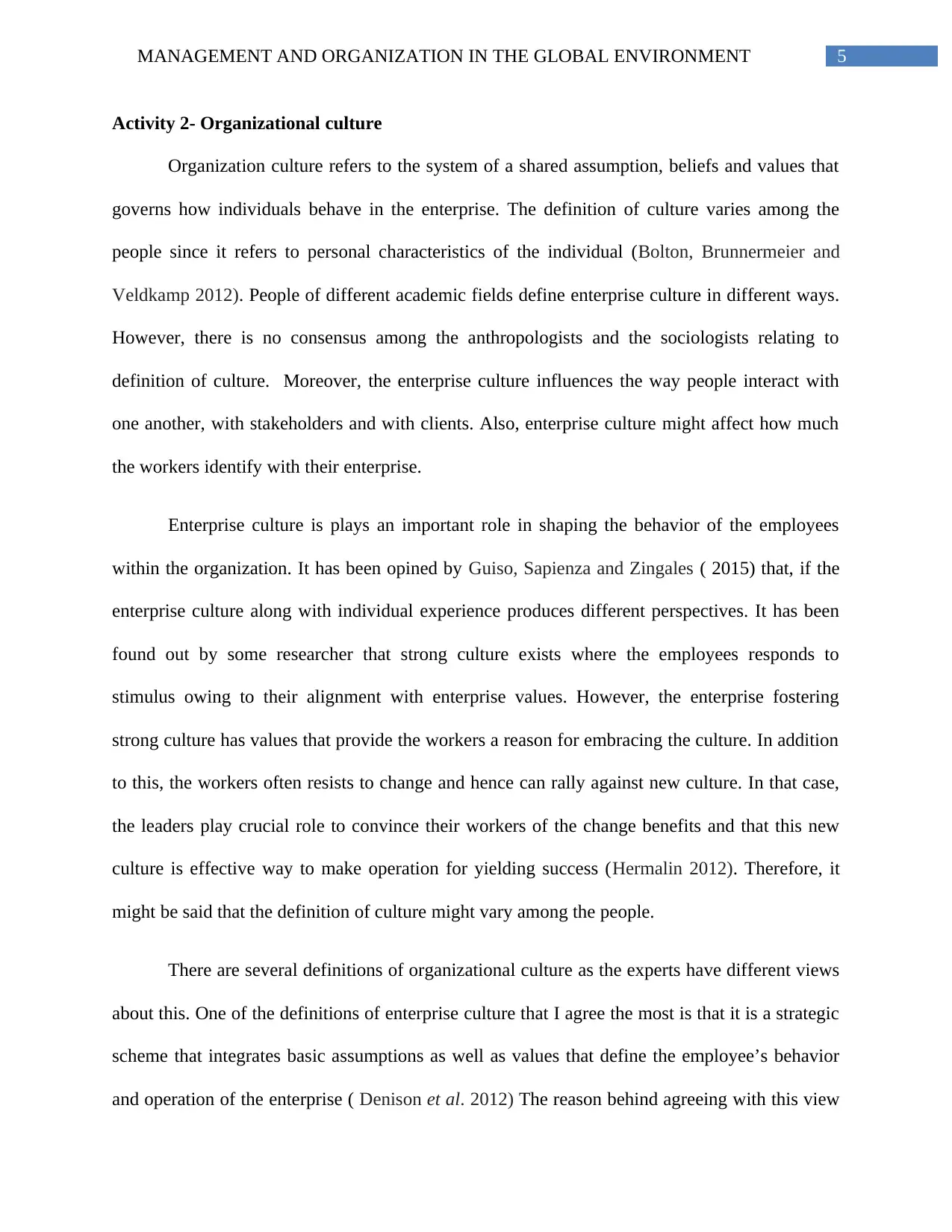
5MANAGEMENT AND ORGANIZATION IN THE GLOBAL ENVIRONMENT
Activity 2- Organizational culture
Organization culture refers to the system of a shared assumption, beliefs and values that
governs how individuals behave in the enterprise. The definition of culture varies among the
people since it refers to personal characteristics of the individual (Bolton, Brunnermeier and
Veldkamp 2012). People of different academic fields define enterprise culture in different ways.
However, there is no consensus among the anthropologists and the sociologists relating to
definition of culture. Moreover, the enterprise culture influences the way people interact with
one another, with stakeholders and with clients. Also, enterprise culture might affect how much
the workers identify with their enterprise.
Enterprise culture is plays an important role in shaping the behavior of the employees
within the organization. It has been opined by Guiso, Sapienza and Zingales ( 2015) that, if the
enterprise culture along with individual experience produces different perspectives. It has been
found out by some researcher that strong culture exists where the employees responds to
stimulus owing to their alignment with enterprise values. However, the enterprise fostering
strong culture has values that provide the workers a reason for embracing the culture. In addition
to this, the workers often resists to change and hence can rally against new culture. In that case,
the leaders play crucial role to convince their workers of the change benefits and that this new
culture is effective way to make operation for yielding success (Hermalin 2012). Therefore, it
might be said that the definition of culture might vary among the people.
There are several definitions of organizational culture as the experts have different views
about this. One of the definitions of enterprise culture that I agree the most is that it is a strategic
scheme that integrates basic assumptions as well as values that define the employee’s behavior
and operation of the enterprise ( Denison et al. 2012) The reason behind agreeing with this view
Activity 2- Organizational culture
Organization culture refers to the system of a shared assumption, beliefs and values that
governs how individuals behave in the enterprise. The definition of culture varies among the
people since it refers to personal characteristics of the individual (Bolton, Brunnermeier and
Veldkamp 2012). People of different academic fields define enterprise culture in different ways.
However, there is no consensus among the anthropologists and the sociologists relating to
definition of culture. Moreover, the enterprise culture influences the way people interact with
one another, with stakeholders and with clients. Also, enterprise culture might affect how much
the workers identify with their enterprise.
Enterprise culture is plays an important role in shaping the behavior of the employees
within the organization. It has been opined by Guiso, Sapienza and Zingales ( 2015) that, if the
enterprise culture along with individual experience produces different perspectives. It has been
found out by some researcher that strong culture exists where the employees responds to
stimulus owing to their alignment with enterprise values. However, the enterprise fostering
strong culture has values that provide the workers a reason for embracing the culture. In addition
to this, the workers often resists to change and hence can rally against new culture. In that case,
the leaders play crucial role to convince their workers of the change benefits and that this new
culture is effective way to make operation for yielding success (Hermalin 2012). Therefore, it
might be said that the definition of culture might vary among the people.
There are several definitions of organizational culture as the experts have different views
about this. One of the definitions of enterprise culture that I agree the most is that it is a strategic
scheme that integrates basic assumptions as well as values that define the employee’s behavior
and operation of the enterprise ( Denison et al. 2012) The reason behind agreeing with this view
⊘ This is a preview!⊘
Do you want full access?
Subscribe today to unlock all pages.

Trusted by 1+ million students worldwide
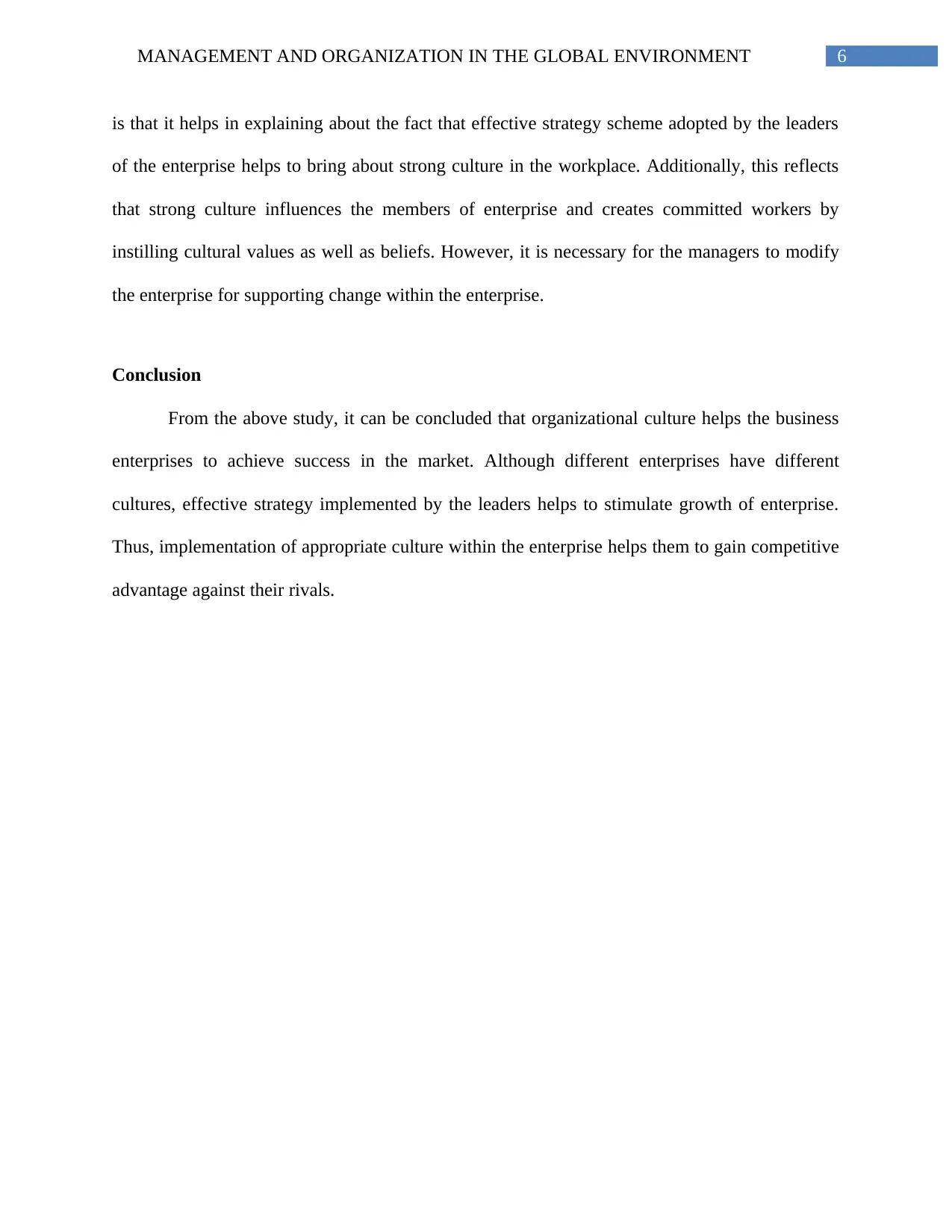
6MANAGEMENT AND ORGANIZATION IN THE GLOBAL ENVIRONMENT
is that it helps in explaining about the fact that effective strategy scheme adopted by the leaders
of the enterprise helps to bring about strong culture in the workplace. Additionally, this reflects
that strong culture influences the members of enterprise and creates committed workers by
instilling cultural values as well as beliefs. However, it is necessary for the managers to modify
the enterprise for supporting change within the enterprise.
Conclusion
From the above study, it can be concluded that organizational culture helps the business
enterprises to achieve success in the market. Although different enterprises have different
cultures, effective strategy implemented by the leaders helps to stimulate growth of enterprise.
Thus, implementation of appropriate culture within the enterprise helps them to gain competitive
advantage against their rivals.
is that it helps in explaining about the fact that effective strategy scheme adopted by the leaders
of the enterprise helps to bring about strong culture in the workplace. Additionally, this reflects
that strong culture influences the members of enterprise and creates committed workers by
instilling cultural values as well as beliefs. However, it is necessary for the managers to modify
the enterprise for supporting change within the enterprise.
Conclusion
From the above study, it can be concluded that organizational culture helps the business
enterprises to achieve success in the market. Although different enterprises have different
cultures, effective strategy implemented by the leaders helps to stimulate growth of enterprise.
Thus, implementation of appropriate culture within the enterprise helps them to gain competitive
advantage against their rivals.
Paraphrase This Document
Need a fresh take? Get an instant paraphrase of this document with our AI Paraphraser
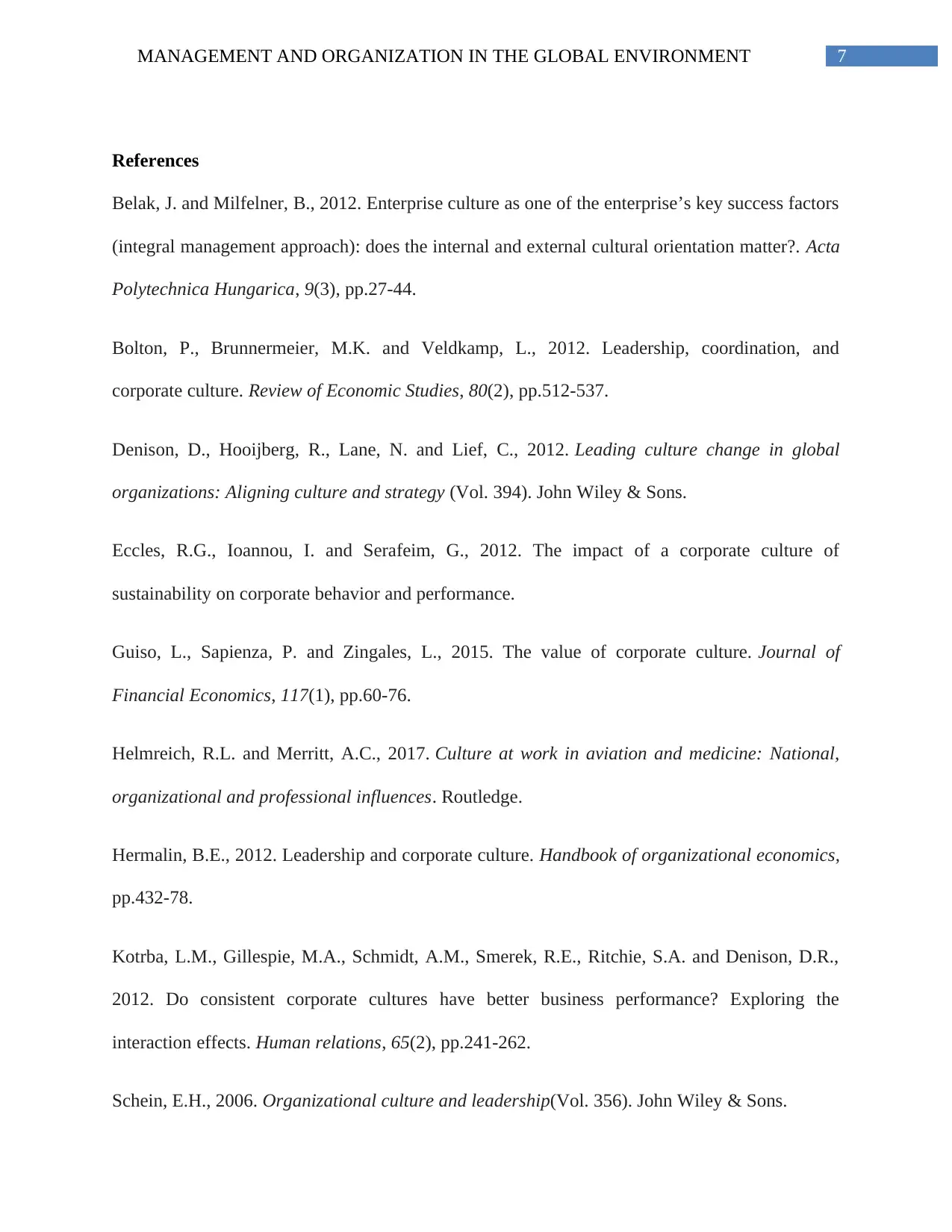
7MANAGEMENT AND ORGANIZATION IN THE GLOBAL ENVIRONMENT
References
Belak, J. and Milfelner, B., 2012. Enterprise culture as one of the enterprise’s key success factors
(integral management approach): does the internal and external cultural orientation matter?. Acta
Polytechnica Hungarica, 9(3), pp.27-44.
Bolton, P., Brunnermeier, M.K. and Veldkamp, L., 2012. Leadership, coordination, and
corporate culture. Review of Economic Studies, 80(2), pp.512-537.
Denison, D., Hooijberg, R., Lane, N. and Lief, C., 2012. Leading culture change in global
organizations: Aligning culture and strategy (Vol. 394). John Wiley & Sons.
Eccles, R.G., Ioannou, I. and Serafeim, G., 2012. The impact of a corporate culture of
sustainability on corporate behavior and performance.
Guiso, L., Sapienza, P. and Zingales, L., 2015. The value of corporate culture. Journal of
Financial Economics, 117(1), pp.60-76.
Helmreich, R.L. and Merritt, A.C., 2017. Culture at work in aviation and medicine: National,
organizational and professional influences. Routledge.
Hermalin, B.E., 2012. Leadership and corporate culture. Handbook of organizational economics,
pp.432-78.
Kotrba, L.M., Gillespie, M.A., Schmidt, A.M., Smerek, R.E., Ritchie, S.A. and Denison, D.R.,
2012. Do consistent corporate cultures have better business performance? Exploring the
interaction effects. Human relations, 65(2), pp.241-262.
Schein, E.H., 2006. Organizational culture and leadership(Vol. 356). John Wiley & Sons.
References
Belak, J. and Milfelner, B., 2012. Enterprise culture as one of the enterprise’s key success factors
(integral management approach): does the internal and external cultural orientation matter?. Acta
Polytechnica Hungarica, 9(3), pp.27-44.
Bolton, P., Brunnermeier, M.K. and Veldkamp, L., 2012. Leadership, coordination, and
corporate culture. Review of Economic Studies, 80(2), pp.512-537.
Denison, D., Hooijberg, R., Lane, N. and Lief, C., 2012. Leading culture change in global
organizations: Aligning culture and strategy (Vol. 394). John Wiley & Sons.
Eccles, R.G., Ioannou, I. and Serafeim, G., 2012. The impact of a corporate culture of
sustainability on corporate behavior and performance.
Guiso, L., Sapienza, P. and Zingales, L., 2015. The value of corporate culture. Journal of
Financial Economics, 117(1), pp.60-76.
Helmreich, R.L. and Merritt, A.C., 2017. Culture at work in aviation and medicine: National,
organizational and professional influences. Routledge.
Hermalin, B.E., 2012. Leadership and corporate culture. Handbook of organizational economics,
pp.432-78.
Kotrba, L.M., Gillespie, M.A., Schmidt, A.M., Smerek, R.E., Ritchie, S.A. and Denison, D.R.,
2012. Do consistent corporate cultures have better business performance? Exploring the
interaction effects. Human relations, 65(2), pp.241-262.
Schein, E.H., 2006. Organizational culture and leadership(Vol. 356). John Wiley & Sons.
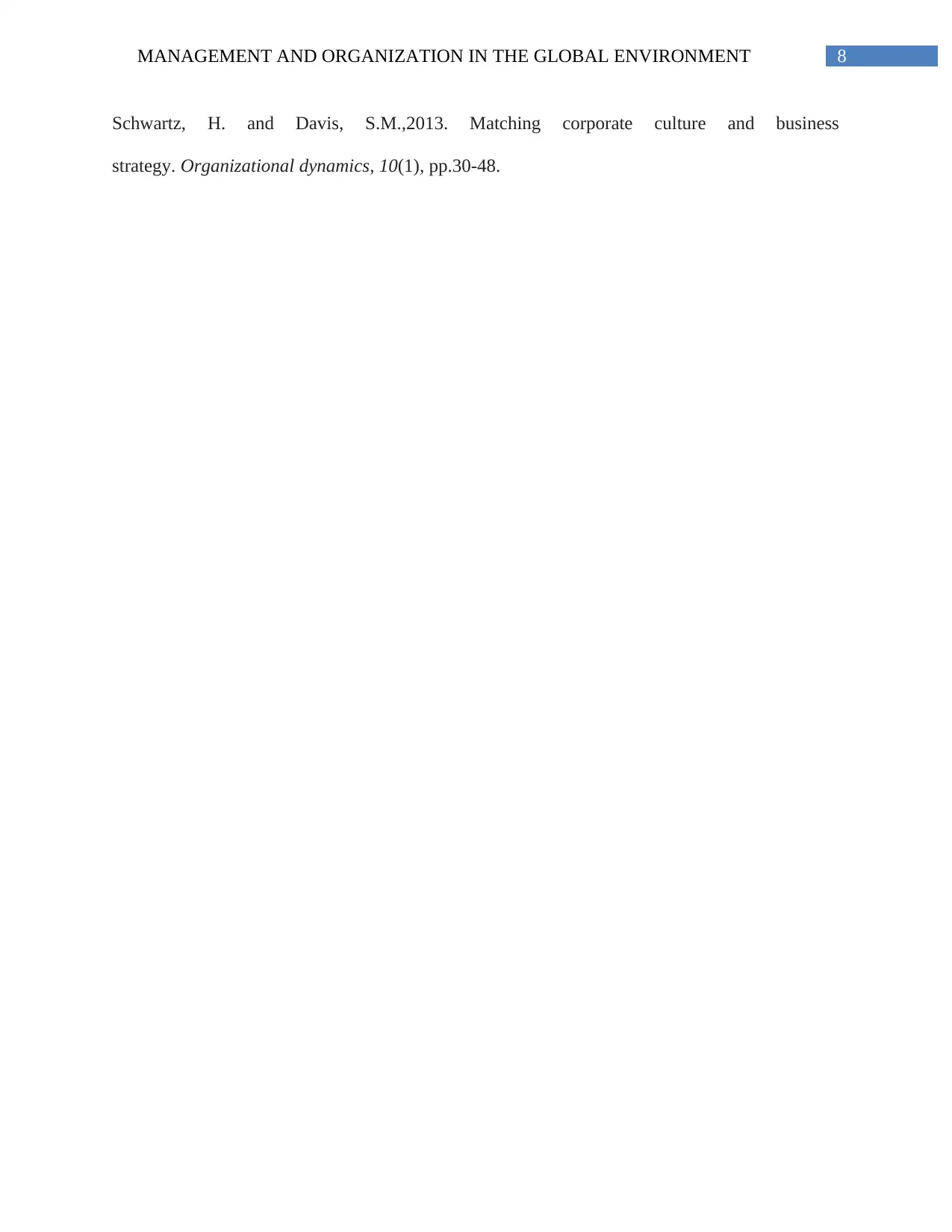
8MANAGEMENT AND ORGANIZATION IN THE GLOBAL ENVIRONMENT
Schwartz, H. and Davis, S.M.,2013. Matching corporate culture and business
strategy. Organizational dynamics, 10(1), pp.30-48.
Schwartz, H. and Davis, S.M.,2013. Matching corporate culture and business
strategy. Organizational dynamics, 10(1), pp.30-48.
⊘ This is a preview!⊘
Do you want full access?
Subscribe today to unlock all pages.

Trusted by 1+ million students worldwide
1 out of 9
Related Documents
Your All-in-One AI-Powered Toolkit for Academic Success.
+13062052269
info@desklib.com
Available 24*7 on WhatsApp / Email
![[object Object]](/_next/static/media/star-bottom.7253800d.svg)
Unlock your academic potential
Copyright © 2020–2026 A2Z Services. All Rights Reserved. Developed and managed by ZUCOL.





